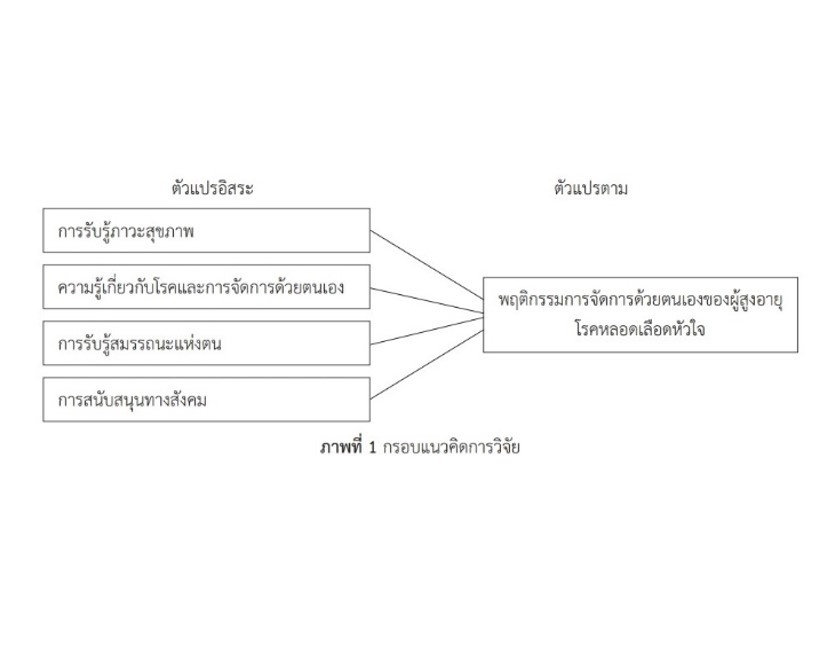ปัจจัยที่มีความสัมพันธ์กับพฤติกรรมการจัดการด้วยตนเองของผู้สูงอายุโรคหลอดเลือดหัวใจ
คำสำคัญ:
พฤติกรรมการจัดการด้วยตนเอง, การรับรู้สมรรถนะแห่งตน, การรับรู้ภาวะสุขภาพ, ความรู้เกี่ยวกับโรคและการจัดการด้วยตนเอง, ผู้สูงอายุโรคหลอดเลือดหัวใจบทคัดย่อ
การวิจัยครั้งนี้มีวัตถุประสงค์เพื่อศึกษาพฤติกรรมการจัดการด้วยตนเอง และปัจจัยที่มีความสัมพันธ์กับพฤติกรรมการจัดการด้วยตนเองของผู้สูงอายุโรคหลอดเลือดหัวใจ กลุ่มตัวอย่างคือผู้ที่มีอายุ 60 บริบูรณ์ปีขึ้นไป ที่ได้รับการวินิจฉัยว่าเป็นโรคหลอดเลือดหัวใจและเข้ารับการรักษาอย่างต่อเนื่องที่คลินิกโรคหัวใจโรงพยาบาลสมเด็จพระบรมราชเทวี ณ ศรีราชา ได้มาโดยการสุ่มตัวอย่างแบบง่ายจำนวน 105 คน เครื่องมือการวิจัย ได้แก่ แบบประเมินข้อมูลทั่วไป แบบประเมินการรับรู้ภาวะสุขภาพ แบบประเมินความรู้เกี่ยวกับโรคและการจัดการ ด้วยตนเอง แบบประเมินการรับรู้สมรรถนะแห่งตน แบบประเมินการสนับสนุนทางสังคม และแบบประเมินพฤติกรรมการจัดการด้วยตนเอง วิเคราะห์ข้อมูลด้วยการแจกแจงความถี่ ร้อยละ ค่าเฉลี่ย ส่วนเบี่ยงเบนมาตรฐาน และสถิติสหสัมพันธ์ของเพียร์สัน ผลการวิจัยพบว่า คะแนนเฉลี่ยพฤติกรรมการจัดการด้วยตนเองอยู่ในระดับมาก (M = 67.17, SD = 6.85) การรับรู้สมรรถนะแห่งตน การรับรู้ภาวะสุขภาพ ความรู้เกี่ยวกับโรคและการจัดการด้วยตนเองมีความสัมพันธ์ทางบวกกับพฤติกรรมการจัดการด้วยตนเองอย่างมีนัยสำคัญทางสถิติ (r = .571, .428, .284 ,p < .01 ตามลำดับ)
การศึกษาครั้งนี้มีข้อเสนอแนะว่าพยาบาลและบุคลากรทีมสุขภาพ สามารถนำผลการวิจัยไปในการ วางแผนการดูแลที่เหมาะสม เพื่อส่งเสริมให้ผู้สูงอายุโรคหลอดเลือดหัวใจมีพฤติกรรมการจัดการด้วยตนเองให้ดียิ่งขึ้นและต่อเนื่องโดยให้ความสำคัญกับการรับรู้สมรรถนะตนเอง การรับรู้ภาวะสุขภาพตนเอง และความรู้เกี่ยวกับโรคและการจัดการด้วยตนเอง
เอกสารอ้างอิง
Annual Report Somdej Phraborom Ratchathewi Sriracha Hospital. (2020). Registration and statistics: Top 10 OPD patients aged 60 years and over, 2019. Chonburi: Registration and Statistics.
Chaiwong, N., Duangpaeng, S., & Masingboon, K. (2014). Factors influencing self-management behaviors among acute myocardial infarction patients. Thai Pharmaceutical and Health Science Journal, 9(3), 112-119. [In Thai]
Cohen, J. (1988). Statistical power analysis for the behavioral science (2nd ed.). Hillsdale: Lawrence Eribaum.
Dehmer, G. J., Badhwar, V., Bermudez, E. A., Cleveland Jr, J. C., Cohen, M. G., D’Agostino, R. S., & Shahian, D. M. (2020). 2020 AHA/ACC key data elements and definitions for coronary revascularization: A report of the American College of Cardiology/American Heart Association task force on clinical data standards (writing committee to develop clinical data standards for coronary revascularization). Journal of the American College of Cardiology, 75(16), 1975-2088.
Eliopoulos, C. (2018). Gerontological nursing (8th ed.). Philadelphia: Lippincott Williams & Wilkins.
Hanhunakul, W. (1997). Effect of constructive adaptation activity on health perception and adaptation in myocardial infarction patients. Master’s Thesis, Nursing Science, Faculty of Nursing. Mahidol University. [In Thai]
Huynh-Hohnbaum, A. L. T., Marshall, L., Villa, V. M., & Lee, G. (2015). Self-management of heart disease in older adults. Home Health Care Services Quarterly, 34(3-4), 159-172.
Jansrithong, P., & Choowattanapakorn, T. (2018). Factors predicting self-management in older person with acute coronary syndrome in tertiary hospitals, Bangkok. Journal of Nursing Science Chulalongkorn University, 30(2), 81-94. [In Thai]
Jitapunkul, S. (1999). Principles of geriatric medical (2nd ed.). Bangkok: Faculty of Medical Chulalongkorn University. [In Thai]
Kanfer, F. H., & Gaelick, L. (1991). Self-management method. In F. H. Kanfer, & A. Goldstein (Eds.), Helping people change: A textbook of methods (4th ed., pp. 305-360). New York: Pergamon Press.
Karoly, P., & Kanfer, F. H. (1982). Self-management and behavior change: From theory to practice. New York: Pergamon Press.
Khatun, T., Maqbool, D., Ara, F., Sarker, M. R., Anwar, K. S., & Hoque, A. (2021). Dietary habits of patients with coronary artery disease in a tertiary-care hospital of Bangladesh: A case-controlled study. Journal of Health, Population and Nutrition, 40(1), 1-6.
Miller, C. A. (2019). Nursing for wellness in older adults (8th ed.). New York: Lippincott Williams & Wilkins.
Phuaphae, J., Jitmontree, N., & Leelahakul, V. (2015). Factor predicting self-management behaviors among older persons with cardiovascular risks. Journal of Nursing Science, 33(2), 41-50. [In Thai]
Sirikutjatuporn, K., Wirojratana, V., & Jitramontree. N. (2017). Factor predicting self-management behavior of elderly type 2 diabetes patients. Thai Journal of Nursing Council, 32(1), 81-93. [In Thai]
Strategy and Planning Division, Ministry of Public Health. (2017). Public health statistics A.D.2017. Retrieved from http://bps.moph.go.th/new_bps/sites/default/files/stratistics60.pdf
Teeotid, W., Kunsongkeit, W., & Dungpaeng, S. (2019). Factor influencing self-management behaviors of sodium restriction among congestive heart failure patients. Journal of Boromarajonani College of Nursing, Bangkok, 35(1), 120-129. [In Thai]
Touhy, T. A., & Jett, K. F. (2016). Ebersole & Hess' toward healthy aging: human needs and nursing response. St. Louis: Elsevier Mosby.
Wangnum, K. (2017). Factor related to self-care agency of older people with cancer receiving chemotherapy. Master’s Thesis, Gerontological Nursing, Faculty of Nursing. Chulalongkorn University. [In Thai]
Willard-Grace, R., Devore, D., Chen, E. H., Hessler, D., Bodenheimer, T., & Thom, D. H. (2013). The effectiveness of medical assistant health coaching for low-income patients with uncontrolled diabetes, hypertension, and hyperlipidemia: Protocol for a randomized controlled trial and baseline characteristics of the study population. BioMed Central Family Practice, 14(1), 1-10.
World Health Organization [WHO]. (2020). Cardiovascular diseases. Retrieved from https://www.who.int/health-topics/cardiovascular diseases

ดาวน์โหลด
เผยแพร่แล้ว
รูปแบบการอ้างอิง
ฉบับ
ประเภทบทความ
สัญญาอนุญาต

อนุญาตภายใต้เงื่อนไข Creative Commons Attribution-NonCommercial-NoDerivatives 4.0 International License.




